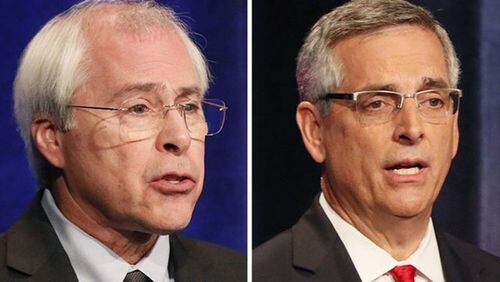After an election marred by voting problems, Georgia voters will decide in Tuesday’s runoff who should fix them.
One candidate for Georgia secretary of state wants to tackle voter purges, long lines and voting rights. His opponent prefers leaving most elections management to county officials and improving training.
Democrat John Barrow, a former U.S. congressman, said he’d seek both voting fairness and accuracy if elected as the state’s top elections official. He faces Republican Brad Raffensperger, an engineering firm CEO who said he would ensure only U.S. citizens can vote and mostly maintain Georgia’s current election process.
Voting rights became a major issue during this year's close election for governor that dragged on for nearly two weeks amid confusion over how to count ballots with missing information, voters whose registrations weren't processed and equipment malfunctions. Georgia's former secretary of state, Republican Brian Kemp, won the election for governor against Democrat Stacey Abrams, whose allies filed a federal lawsuit this week over election irregularities.
Barrow trailed Raffensperger by less than 1 percentage point in the Nov. 6 general election, and a runoff is required because neither candidate won a majority of the votes. Libertarian Smythe DuVal, who has endorsed Barrow, received just over 2 percent of the vote.
Barrow is running as a moderate who said he believes in maintaining Georgia's photo ID laws but making it more difficult to cancel someone's voter registration.
Raffensperger, a conservative state representative from Johns Creek since 2015, emphasizes the need to combat potential voter fraud, which is extremely rare in Georgia in part because of the requirement for voters to show photo ID.
“The only problem he wants to talk about is the one we’re already solving,” Barrow said in an interview. “He doesn’t want to address the problem of purges, which go too far and purge people through no fault of their own. What we need is somebody who can address (voting rights) issues in a bipartisan fashion.”
Raffensperger didn't make himself available for an interview this week, and he skipped a televised debate Tuesday so he could attend a fundraising event for his campaign in Moultrie. The debate went on with Barrow debating against an empty podium.
As an engineer and CEO, Raffensperger has said he’s most qualified to manage the Secretary of State’s Office, which oversees elections, business registrations and professional licensing. If elected, he said he’d support county election officials.
Raffensperger minimized the problems voters encountered with registrations, lines and voting machines during this month's election.
"There's been a lot of hyperbole. People have spun things up out of whole cloth in many instances," Raffensperger said on The Shelley Wynter Show on WYAY-FM (106.7) this week. "If you look at how many precincts we have in this election, and how many issues we've had, there was actually very few precincts" with problems.
After the intense election for governor earlier this month, the runoff for secretary of state is relatively quiet, with low turnout expected.
But Georgians should pay attention to the race if they care about democracy and voting rights, said Sara Henderson, executive director for Common Cause Georgia, a government accountability organization.
“The ideal candidate would support an open, transparent office and is willing to submit the office to a full audit to help ensure transparency,” Henderson said. “Of all the campaign promises, transparency is key. Citizens must have a knowledge and input in all decisions related to our elections systems in Georgia.”
Among the biggest differences between the candidates is how they’d approach canceling registrations of inactive voters. The registrations of more than 1.4 million Georgia voters were canceled since 2012, in many cases because they didn’t vote in at least two federal election cycles or respond to letters from election officials.
Raffensperger said voter lists need to be regularly pared down to remove people who might have moved or died, and that voters’ failure to participate in elections indicates they might not be eligible Georgia voters.
"We need to make sure that we keep the voter rolls clean, fresh and accurate," Raffensperger told Channel 2 Action News last week. "At the end of the day, we want to make sure that who shows up is who they say they are."
Barrow said voters shouldn’t lose their voting rights just because they haven’t used them. He said voters often discard letters from election officials because they look like junk mail, and the government should make greater efforts to confirm someone has moved before disqualifying them from voting.
“It should not be easier to get kicked off the rolls as an honest citizen minding your own business than it is to get your water turned off,” Barrow said. “They’ve been purged without their knowing about it, and their vote will not get counted. It’s happening to a lot of people, and that’s not acceptable.”
Both candidates say it's time to replace Georgia's 16-year-old electronic voting machines with a system that leaves a verifiable paper trail, but they disagree on the best option. The Georgia General Assembly will consider legislation to buy a new voting system next year, at a cost of $20 million to over $100 million, and the secretary of state will be responsible for implementing it.
Raffensperger prefers buying touchscreen machines that print a ballot for voters to review and then insert into an optical scanner for tabulation. Barrow supports filling out paper ballots by hand and then feeding them into a scanner.
The solution favored by Raffensperger, called ballot-marking devices, would help prevent human errors but be more expensive than hand-marked paper ballots. They would also put another computer between voters and their ballots, raising concerns from election integrity advocates about the potential for elections to be hacked.
Barrow said hand-marked paper ballots prevent hacking, and if elected he would decertify Georgia’s current direct-recording electronic voting machines because he said they can’t be trusted to produce accurate results.









